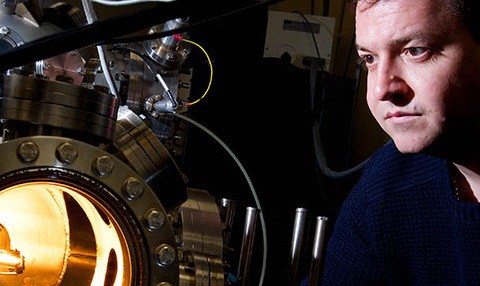
A new Masters programme in nanoscience and nanotechnology has been specifically designed to give students the skills and experience they need to work in the fast-moving nanotechnology industry. The course, which was launched in September 2018 by the University of Central Lancashire (UCLan) in the UK, builds on the university’s strong reputation for nanotechnology research, as well as its established links with industrial partners in the UK and beyond.
According to Dr Joe Smerdon, the course leader, the hope is “to convert some of these MSc candidates directly into employees”. One notable feature of the course is an optional one-year industrial placement, and even the more conventional taught elements of the course will enable students to interact with companies developing commercial applications for nanotechnology.
“We wanted to make the course very relevant to employers,” says Smerdon. “We will be bringing in industrial partners to talk about nanotechnology and their current challenges, and then incorporate that insight into the teaching programme.”
They can work within our areas of research, complete an industrial placement, and then potentially be offered a suitable position with the industrial partner
Dr Tapas Sen, UCLan
Smerdon explains that prospective employers will be able to engage directly with the students from the beginning of the second semester all the way through to the end of the course. “There’s one module that allows students to directly participate in a challenging problem posed to them by the industrial partners, and the partners have the option of assessing their work if they want to – both at the proposal stage and the final project stage.”
The hope is that such direct interaction early in the course could pave the way for a final-year project working with the partner, or an industrial placement that would enable the student to really understand what it’s really like to work for the company. “The students have the option of doing a full year’s placement with a partner: they do the first two semesters at UCLan, spend a year with an industrial partner, and then return for the third semester,” explains Smerdon.
Prospective employers also have the opportunity to get to know the students they are working with. “They can indicate whether they are interested in working with particular students for their placement year or final-year project,” he says. “It’s very hard to select an engineer or a scientist based on an interview or presentation, and this way they get up to a year to find the right candidate.”
The extra industrial year could be particularly appealing for international students, since a one-year MSc is generally not recognized outside the UK. But according to Dr Tapas Sen, one of the other post-graduate course leaders, the real attraction for overseas students will be the potential to find a job with a local company. “They can work within our areas of research, complete an industrial placement, and then potentially be offered a suitable position with the industrial partner,” he says.
Hub for industrial research
And it’s not just the industrial connections that students will benefit from. UCLan is developing a centre for nanotechnology research, with several of the course tutors, including Smerdon, recently completing five-year research fellowships at the university. “We’re all high-performing researchers in nanotechnology, and we have built the course around this core expertise,” he says.
Launching the course is also part of a wider aim to establish UCLan as a hub for industrial nanoscience. Another major initiative, overseen by Sen, has been to establish a Society for Functional Nanomaterials to enable two-way communication between academia and industry. “One of the main reasons for slow development of nanoscience in real-life applications is a lack of understanding and collaboration between industry and academia,” he comments.
And both Smerdon and Sen are confident that nanotechnology will be a major driver for future innovation in the commercial sector. “We’re seeing a few things now, such as quantum-dot televisions that deliver better colour rendition, but there’s a whole more just around the corner,” says Smerdon. “We’re still not really exploiting the inherent benefits of nanosized materials and structures, and when we do nanotechnology will become increasingly ubiquitous.”
Smerdon is confident that the course offers a natural progression for students who have completed an undergraduate degree in the physical sciences. Michael Holmes, who embarked on the course after finishing an undergraduate degree in astrophysics, agrees: “My experience during this degree has been very positive,” he says. “I was worried about adapting to nanoscale science, but continued communication and support from all staff made it a very smooth transition.”
A core module in nanoscience and nanotechnology runs throughout the course, offering a multidisciplinary approach that spans physics, chemistry and the biosciences. Students can also choose optional modules in physics and chemistry that are pitched at different levels based on their existing knowledge. “The course offers a good balance of taught and self-taught modules,” says Holmes. “For example, the taught Advanced Nanophysics module was a great complement to the Current Topics in Industrial Nanoscience module, which involved a lot of individual research.”
Some of the modules are taught in the traditional way, through lectures, seminars and tutorials, and Smerdon says that compared to an undergraduate degree there’s not a great deal of difference in terms of teaching time and the level of support students receive from the lecturers. But students have more opportunities for self-directed research, and also have the freedom to pursue their own interests – whether that’s in industry or academia.
“I really enjoyed the freedom to use the most modern and advanced techniques,” agrees Holmes. “It felt very satisfying and fulfilling, especially compared to undergraduate work.”
- The minimum entry requirements for UCLAn’s MSc in Nanoscience and Nanotechnology is a 2:2 in physics, chemistry, or a related subject, plus international students must meet a minimum language requirement (International English Language Test (IELTS) with an overall score of 6.5 and no element should be less than 6). Applications are open year round, for entry in September, and most students can apply for funding through a Postgraduate Master’s Loan.




